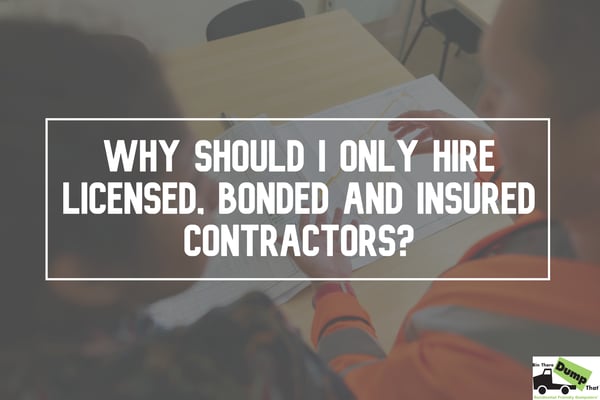“Anything that can go wrong, will go wrong.”
It’s okay to not like Murphy’s Law. Honestly, I don’t know anyone who does. That’s because it makes us think about the worst case scenario. And no one ever really wants to think about worst case scenarios — especially when home renovations are involved. It just sounds costly and dangerous.
For some peace of mind, Bin There Dump That likes to inform our customers that we’re a licensed, bonded and insured dumpster rental company. And anytime you invite a skilled laborer onto your property — roofers, plumbers, electricians, etc. — it’s wise to hire only those that are licensed, bonded and insured, as well.

But what does licensed, bonded and insured mean? And more importantly, what does it mean to you? It’s important to remember that rules and regulations may vary from state to state, but here’s a brief breakdown of each credential and why it’s necessary.
What Does It Mean To Be Licensed?
When a contractor is licensed, it normally indicates that he or she has the minimum insurance and bonding required by the local government. And if the contractor is interested in pulling a permit at local building department, being licensed is a preliminary requirement to make that happen.
There are also trade-specific licenses that go above and beyond basic contractor licenses. And as the name implies, this license is for laborers who specialists in a given area — HVAC technicians, electricians, masons. A trade-specific license involves apprenticing, testing and continued education.
To find a listing agency in your state, check out the website for the National Association of State Contractors Licensing Agencies. Also, for any home improvement contractors you’re thinking about hiring, look at their marketing and advertising materials — their license number should be included, which you can take to the Better Business Bureau for a performance report.
What Does It Mean To Be Bonded?
In most cases, the bond comes before the license. Contractors purchase a surety bond, which is a form of insurance that serves as a safety net for the homeowner. If a contractor fails to fulfill what was agreed upon in their contract with the homeowner, the bond will cover the expenses required to correct or complete the job.
Some additional expenses a bond might cover are unpaid workers on the project, supply bills, property damage and even theft. Similar to insurance, contractors pay a premium to stay bonded and if an issue should arise, the homeowner would file a claim to the bond provider to in order to receive remunerations.

What Does It Mean To Be Insured?
Insurance — this requirement is probably the most obvious of the three. In short, uninsured contractors put the homeowner at risk of being held liable if a laborer is injured on the worksite (your property).
Contractors with liability insurance will cover any property damage or injuries incurred while working on your home. Another common type of contractor insurance is workers’ compensation, which ensures the injured worker is paid and medical expenses are covered no matter who was at fault.
Bin There Dump That Dumpster Rental Is Licensed, Bonded And Insured
By doing your due diligence and vetting contractors to ensure they’re licensed, bonded and insured, it’ll make Murphy’s Law not that bad after all. And when it comes to dumpster rental, we’ve got you covered — because we’re covered. Ask us for our credentials, we’ll be happy to show you. To get started with your dumpster rental, visit our website to find the franchise operator nearest you.
Images: Hole in ceiling, Fellas on the roof

